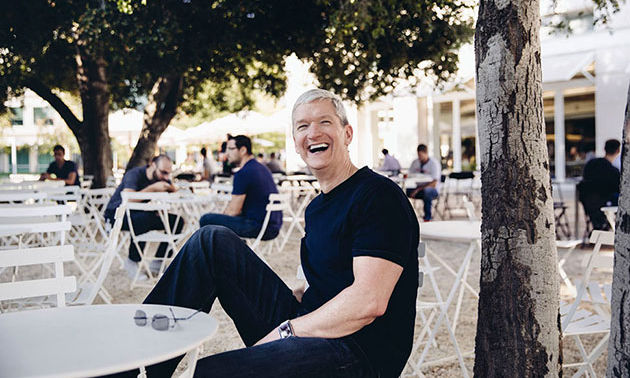Apple CEO Tim Cook continued his media tour on Thursday by participating in a short interview featured on NPR's "All Things Considered," where he discussed the importance of consumer data protection and implications of America's tax code.
Cook sat down with NPR's Robert Siegel in a one-on-one interview to discuss hot-button issues like user privacy and why Apple keeps piling up overseas cash. While the talk mainly covers well-trod ground, the Apple chief did provide a few nuggets of insight.
When asked about Apple's stance on data privacy and the potential for government backdoors, Cook said, "I don't think you will hear the NSA asking for a back door. [...] There have been different conversations with the FBI, I think, over time — I read in the newspaper myself. But my own view is everyone's coming around to some core tenets, and those core tenets are encryption is a must in today's world. And I think everybody is coming around also to recognizing that any backdoor means a backdoor for bad guys as well as good guys, so a backdoor is a non-starter."
Apple has been an outspoken opponent of government snooping operations, and to that end introduced strong encryption in iOS 8 to make data acquisition — both legal and illicit — extremely difficult. Certain law enforcement agencies came down hard, saying Apple's methods hinder time-sensitive operations and could in some cases endanger the public.
Siegel later asked whether Cook is referring to Google when he makes hard-nosed statements against companies that commoditize user data. As usual, Cook said customers are not products for Apple, explaining how the company views data gathered by online stores like iTunes and the App Store.
"If you buy something from the App Store — and we do know what you bought from the App Store, obviously — we think customers are fine with that. Many customers want us to recommend an app," Cook said. "But what they don't to do is they don't want your email to be read, and then to pick up on keywords in your email and then to use that information to market you things on a different application that you're using."
As for why Apple is reluctant to repatriate its offshore cash hoard, Cook expectedly cited steep U.S. tax regulations as a singular motivation. He added that such policies act as a barrier to free cash flow for numerous multinational companies based in America, ultimately stunting economic growth.
"I think one key thing to understand here is that the reason we have a lot of money overseas is that two-thirds of our sales are overseas, and therefore we earn a lot of money overseas," Cook said. "The tax law that we have today is very archaic — it doesn't allow you to bring back money unless you tax both internationally, then pay the full tax domestically as well."
Finally, Cook laughed off the inevitable Apple Car line of questioning, asking, "Do you have another question?"
 AppleInsider Staff
AppleInsider Staff







-m.jpg)






 Charles Martin
Charles Martin
 Christine McKee
Christine McKee
 Wesley Hilliard
Wesley Hilliard
 Malcolm Owen
Malcolm Owen
 Andrew Orr
Andrew Orr
 William Gallagher
William Gallagher
 Sponsored Content
Sponsored Content








37 Comments
NPR? You don't get much coverage on NPR.
[quote name="Softshellcrab" url="/t/188624/tim-cook-meets-with-npr-to-discuss-data-privacy-government-back-doors-taxes-and-more#post_2785086"]NPR? You don't get much coverage on NPR. [/quote] Apple unfortunately has a bit of a blind spot with regards to media. It was most noticeable when they showed the partners for News, almost all of which were leftist.
I heard it. But I'm an NPR nerd.
...so why does safari continue to open a 'new window' in non-private mode off a link when the prefs are set to 'safari opens with a new private window'...? Geotagging, face id, pix in address book, icloud, yada yada - has there been potential incremental erosion of user privacy built in to every OS update...?
[quote name="Softshellcrab" url="/t/188624/tim-cook-meets-with-npr-to-discuss-data-privacy-government-back-doors-taxes-and-more#post_2785086"]NPR? You don't get much coverage on NPR. [/quote] That program is one of the most popular radio programs in the US. So, it's a fair bit of coverage.